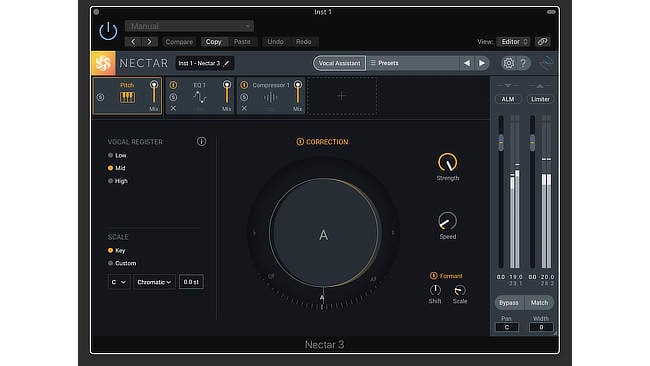
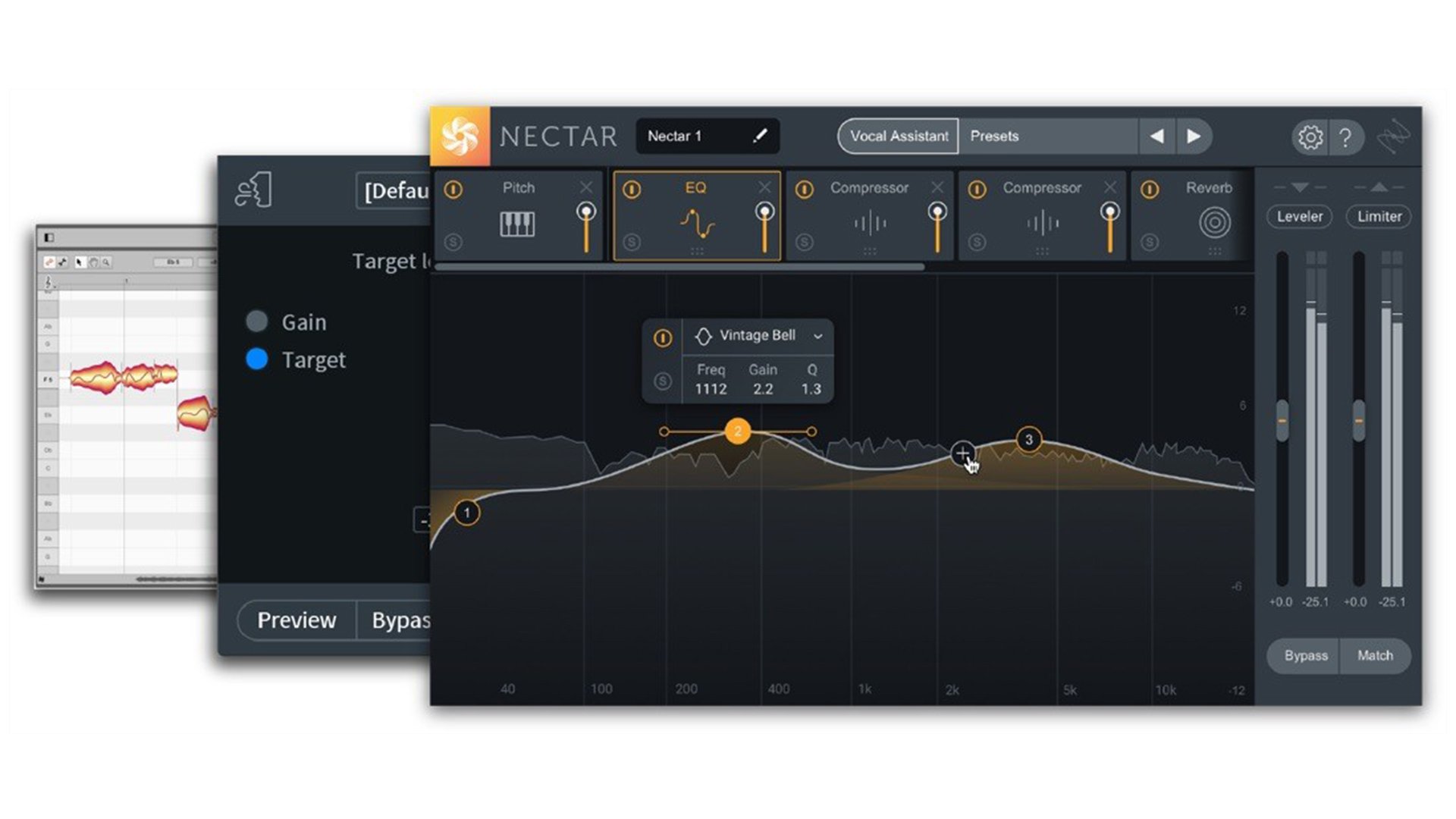
Vocal sound improvement and downright alteration are the strengths of iZotope’s Nectar plug-in. Version 3 has been given a new interface design with much more intuitive controls and new features.
For dialogue, Nectar 3 gives your recordings more presence while keeping the output in check for optimised loudness. But you might also decide to spruce up spoken content by changing the pitch, adding delays and reverb and make the whole thing like it’s from outer space.
Nectar 3 has been re-designed from the ground up. The interface is a radical change from the previous version with more intuitive controls and modules. Nectar 3 is bundled with iZotope RX 7 Breath Control and Celemony’s Melodyne 4 essential.
Breath Control’s algorithm was designed around machine learning, so it allows you to intelligently detect breaths in dialogue or vocal recordings and automatically suppress them. It works very well in RX 7 Advanced, and does so in Nectar 3 as well.
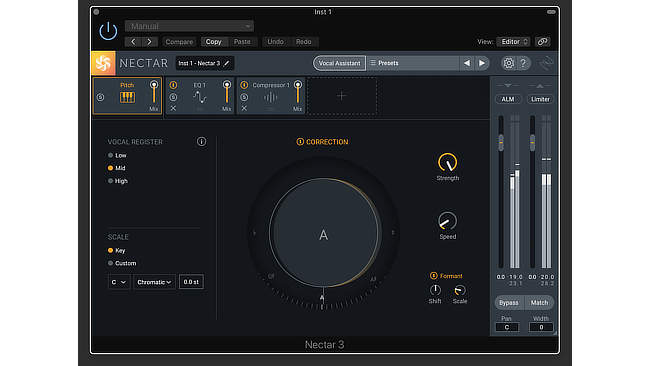
The Pitch correction module with its formant controls
As an added benefit to Nectar 3’s built-in Pitch correction module, iZotope has partnered with Celemony to include Melodyne 4 essential. Melodyne might not immediately ring a bell as it is a bit lesser known and a specialist’s tool, but it offers GRAMMY-award winning pitch and time correction. I have Melodyne 4 Studio on my system and often revisit the application to change just a few notes. You read that right: it allows you to just change even a single note and it includes the ability to change everything about that single note – pitch, length, formant, harmonics…
Melodyne is truly a surgical instrument with relatively intuitive, transparent pitch adjustment capabilities. It’s used in professional studios around the world, but you’ll rarely see it in the average audio dabbler’s tool chest because it’s so surgical. Including Melodyne essential with Nectar is a very clever move of iZotope. They could have gone on developing their own tool, but why would they if the industry standard is readily available?
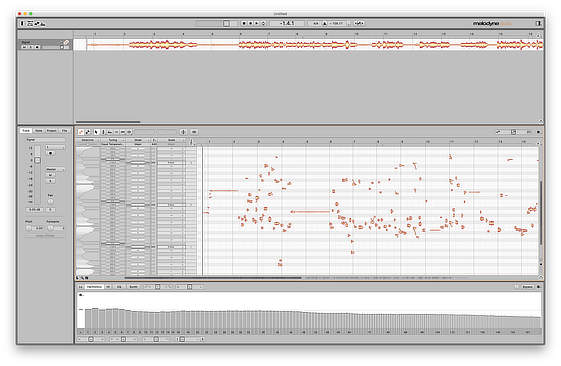
Melodyne Studio lets you edit each note and its harmonics in multiple ways
Having said that, the essential version only contains Melodyne’s Main Tool for the basic editing of pitch and timing. If you want to step up to the full monty, Melodyne Studio will offer you the same capabilities and more as a plug-in, with one form of integration Celemony’s own ARA technology (Audio Random Access), which is currently supported by Apple Logic Pro X, Presonus Studio One, Bandlab Cakewalk/Sonar, Magix Samplitude, Acoustica Mixcraft and Tracktion Waveform. It can be linked to a DAW via Rewire if required as well.
If you’re only interested in optimising vocals as they’re recorded, you can automate the whole thing by using the Assistant module that will listen to your audio and create a custom preset to fit your vocal in the mix, while the Unmask feature will carve out space for the vocal by comparing it to another audio track and correcting frequency masking. The Assistant does a wonderful job, but if you know what you’re doing you can still do better.
To help you beyond pitch correction, the module chain supports two completely redesigned EQ modules, with the ability to set them up as Dynamic EQs. Those follow the harmonics as they change – both audibly and visually. This EQ also allows you to dynamically trigger EQ boosts and cuts.
Furthermore, Nectar 3 has a new Delay module. What is special about that module is that it offers independent stereo delay controls, again with much visual control as to make it very easy to figure out what you’re doing even if you’re only adding tiny bits of delay.
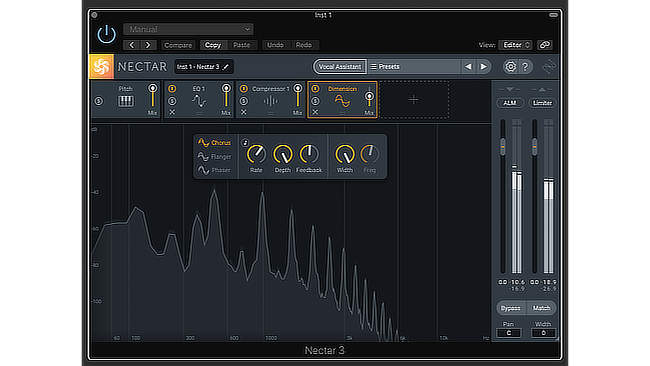
The Dimension module adds Chorus, Flanger or Phaser effects
A new Dimension module allows you to modulate vocals with Chorus, Flanger and Phaser modes. The Reverb module now looks more like an EQ and behaves like one in the sense that you can have specific frequencies reverberate instead of the more traditional all-or-nothing approach.
And the list goes on… Nectar 3 supports up to eight synthetic harmony voices. These appear as little bullets around a centre point with Gain, Pan, Delay, etc as controls. You just drag them around until it sounds as you want.
In short, if you needs to either improve vocal content or change it to make it fit in with a mood or a storyline, Nectar 3 is probably going to be helpful. There’s one thing that I didn’t like about the plug-in, though, but it’s more or less normal given the number of modules you can use: it does hit your CPU quite a bit when you load module after module.
Nectar 3 costs $249. Find out more about at the iZotope website.
Tags: Audio


Comments